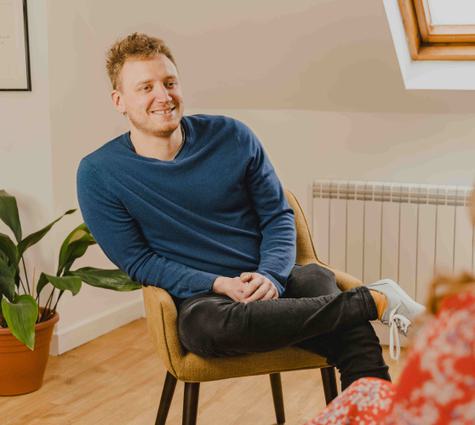Blog: Counsellor Chris Holmes – How Theatr Clwyd came to have an in-house counsellor
See dates and times 25 Oct 2024
News Story
I started working at Theatr Clwyd in February 2022 as a Company Counsellor and Wellbeing Practitioner. In 2018 I crossed paths with Theatr Clwyd and the brilliant work they were doing which started the conversation…

I was part of a collaboration between Flintshire County Council, an NHS trust and a drugs and alcohol charity working with at-risk young people. We worked closely with Theatr Clwyd, whose Creative Engagement Team, led by Gwennan Mair, ran workshops at the theatre, to open the eyes and inspire the young people taking part. The work was rewarding, seeing positive change in kids as young as 10 was brilliant. But it was also deeply challenging. We started talking about how to support the team delivering sessions, as well as the participants. Those conversations continued to grow, particularly under the shadow of the pandemic. Theatr Clwyd recognised the mental health struggles faced by all those involved in the theatre industry and wanted to do something about it.
Mental-Health Challenges
Theatre is a high-pressure environment. The constant need to prove yourself, uncertainties surrounding job security for freelance workers, and the emotional demands of creation and reviews can result in high levels of stress, anxiety, depression, and burnout.
It’s an issue that theatre and arts more broadly are starting to identify. Equity’s review of academic studies focusing on mental health and well-being highlighted concerning trends - from 54% of performing arts students reporting they feel anxious or depressed (1), to individuals in the arts being twice as likely to experience depression compared to those outside (2).
Breaking the Stigma
There is sadly still a stigma surrounding mental health even in the arts and fear of judgement often stifles conversations around mental well-being. To maximise our workforces’ delivery, skills and ability we must foster an open, trusting, and supportive environment that allows us to nurture well-being and establish a culture of understanding (3).
The Benefits
Theatr Clwyd’s recognition of the broad range of mental health support needed by the company led us to work together. For 2 days-a-week I offer a confidential space where team members can explore their emotions, manage stress, and develop effective coping strategies.
“I’d been really struggling with managing the high weight of expectation I was placing on myself. The counselling with Chris helped me to find mechanisms to deal with some of it and realign myself. When I’m less stressed and don’t feel the weight of the world on my shoulders my work exponentially improves – it’s a benefit which is worth its weight in gold. It's been a game-changer for me.”
This work of course has a cost, but it comes with substantial benefits. It can be transformational - rebuilding self-esteem and confidence, equipping us with practical coping skills, and allowing us to deal with difficult emotions more effectively. When people feel supported, it reduces staff absences, increases creativity, and work contributions are better. The tone of a workplace can change, creating a more enjoyable and productive environment.
Having seen the impact mental health support has had on Theatr Clwyd, I believe a healthier stronger industry is possible. By providing mental health support the stigma around it can be reduced and eventually disappear, ensuring the industry thrives as a beacon for creativity and wellness.
My three top tips to try
There are some simple techniques you can try if you find yourself struggling.
Ground Yourself
In times of high emotional turmoil, it's common to feel disconnected from the present moment. Grounding help settle the mind and bring us back to the present, allowing us to make decisions based on both emotion and rationality.
One effective technique is the 5,4,3,2,1 method:
Take a few deep breaths and focus on:
5 things you can see
4 things you can feel
3 things you can hear
2 things you can taste
1 thing you can smell
Adapt the senses to what works best for you.
Reach Out for Support
Seeking support from loved ones is crucial. Professional help, like counselling or helplines, is important, but don't underestimate the power of confiding in friends or family. Venting and feeling heard can be immensely impactful and help to lighten the load.
Give Yourself Compassion
Monitor how you speak to yourself. Instead of self-criticism, imagine speaking to yourself as you would to a friend in the same situation. Be empathetic, patient, and kind. You are just as deserving of your own compassion as much as anyone else
Support
If, after reading this article, you feel you need support, reach out to any of the resources below:
- Applause For Thought:
- Wellbeing in the Arts:
- 0330 123 5574 or 07496 896 436
- support@wellbeinginthearts.org.uk
- Industry Minds:
- info@industryminds.co.uk
- Samaritans:
- Call the UK wide line on 116 123
- Call the Welsh language line on 0808 164 0123 (available 7pm -11pm)
- jo@samaritans.org
- Shout:
- Text ‘Shout’ to 85258
References
- Curtis, J. N. (2019). The mental health of musical theatre students in tertiary education: A pilot study. Studies in Musical Theatre, 13(3), 333-348
- Maxwell, I., Seton, M., & Szabo, M. (2015). The Australian actors’ wellbeing study: A preliminary report. In About Performance (No. 13, pp. 69-113).
- McManus S, Bebbington P, Jenkins R, Brugha T. (eds.) (2016). Mental health and wellbeing in England: Adult psychiatric morbidity survey 2014.

